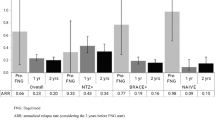Abstract
We report two cases of primary progressive multiple sclerosis (PPMS) included in the INFORMS cohort, experiencing a relapse related to a single MRI gadolinium-enhancing lesion 3 months after fingolimod withdrawal. These two patients share similarities with relapsing-remitting multiple sclerosis cases described in the same situation, suggesting that the initiating process of the active demyelinating plaques is also present in PPMS, even without relapses, but may be triggered as fingolimod is withdrawn. Although the results of the INFORMS study suggest that fingolimod may not slow down the progression, some PPMS patients might still benefit from a disease-modifying treatment.

Similar content being viewed by others
References
Lublin FD, Reingold SC (1996) Defining the clinical course of multiple sclerosis: results of an international survey. National Multiple Sclerosis Society (USA) Advisory Committee on Clinical Trials of New Agents in Multiple Sclerosis. Neurology 46(4):907–911
Lublin F, Miller DH, Freedman MS, Cree BAC, Wolinsky JS, Weiner H, Lubetzki C, Hartung H-P, Montalban X, Uitdehaag BMJ, Merschhemke M, Li B, Putzki N, Liu FC, Häring DA, Kappos L, INFORMS Study Investigators (2016) Oral fingolimod in primary progressive multiple sclerosis (INFORMS): a phase 3, randomised, double-blind, placebo-controlled trial. Lancet Lond Engl 387:1075–1084
Havla JB, Pellkofer HL, Meinl I, Gerdes LA, Hohlfeld R, Kümpfel T (2012) Rebound of disease activity after withdrawal of fingolimod (FTY720) treatment. Arch Neurol 69(2):262–264
Ghezzi A, Rocca MA, Baroncini D, Annovazzi P, Zaffaroni M, Minonzio G, Comi G, Filippi M (2013) Disease reactivation after fingolimod discontinuation in two multiple sclerosis patients. J Neurol 260(1):327–329
Berger B, Baumgartner A, Rauer S, Mader I, Luetzen N, Farenkopf U, Stich O (2015) Severe disease reactivation in four patients with relapsing-remitting multiple sclerosis after fingolimod cessation. J Neuroimmunol 282:118–122
Hakiki B, Portaccio E, Giannini M, Razzolini L, Pastò L, Amato MP (2012) Withdrawal of fingolimod treatment for relapsing-remitting multiple sclerosis: report of six cases. Mult Scler Houndmills Basingstoke Engl 18(11):1636–1639
Confavreux C, Vukusic S (2006) Natural history of multiple sclerosis: a unifying concept. Brain J Neurol 129(Pt 3):606–616
Antel J, Antel S, Caramanos Z, Arnold DL, Kuhlmann T (2012) Primary progressive multiple sclerosis: part of the MS disease spectrum or separate disease entity? Acta Neuropathol (Berl.) 123(5):627–638
Jacques FH (2015) Defining the clinical course of multiple sclerosis: the 2013 revisions. Neurology 84(9):963
Hawker K, O’Connor P, Freedman MS, Calabresi PA, Antel J, Simon J, Hauser S, Waubant E, Vollmer T, Panitch H, Zhang J, Chin P, Smith CH, OLYMPUS Trial Group (2009) Rituximab in patients with primary progressive multiple sclerosis: results of a randomized double-blind placebo-controlled multicenter trial. Ann Neurol 66(4):460–471
Author information
Authors and Affiliations
Corresponding author
Ethics declarations
Conflicts of interest
Pr. Vermersch received honoraria and consulting fees from Biogen, Teva, Genzyme-Sanofi, Merck, Roche, Almirall, Novartis and research supports from Merck, Bayer and Biogen. Dr. Labauge received financial contribution from Novartis and BiogenIdec for travel, honoraria for speaking from Genzyme. Dr. Cambron received consulting fees from Novartis, Genzyme-Sanofi and Teva as well as financial contribution for travel from Novartis, Genzyme-Sanofi, Biogen, Teva, Merck and Bayer. Dr. Duhin received financial contribution from Genzyme and Biogen for travel. Dr. Ayrignac, Carra and Davion have no disclosures.
Ethical standards
All procedures performed in studies involving human participants were in accordance with the ethical standards of the institutional and/or national research committee and with the 1964 Helsinki declaration and its later amendments or comparable ethical standards.
Informed consent
Informed consent was obtained from all participants.
Rights and permissions
About this article
Cite this article
Davion, JB., Cambron, M., Duhin, E. et al. Two cases of relapses in primary progressive multiple sclerosis after fingolimod withdrawal. J Neurol 263, 1361–1363 (2016). https://doi.org/10.1007/s00415-016-8144-x
Received:
Revised:
Accepted:
Published:
Issue Date:
DOI: https://doi.org/10.1007/s00415-016-8144-x




